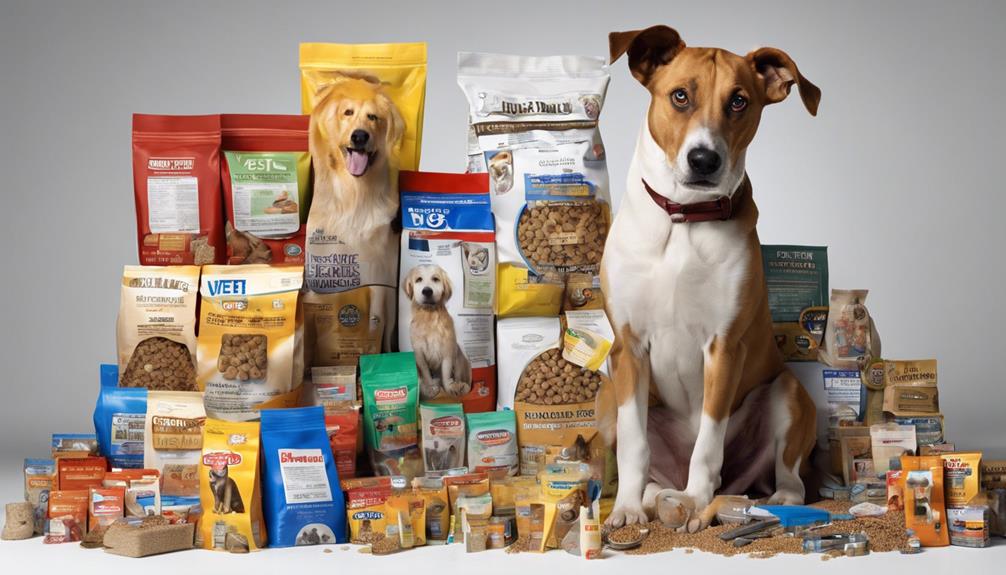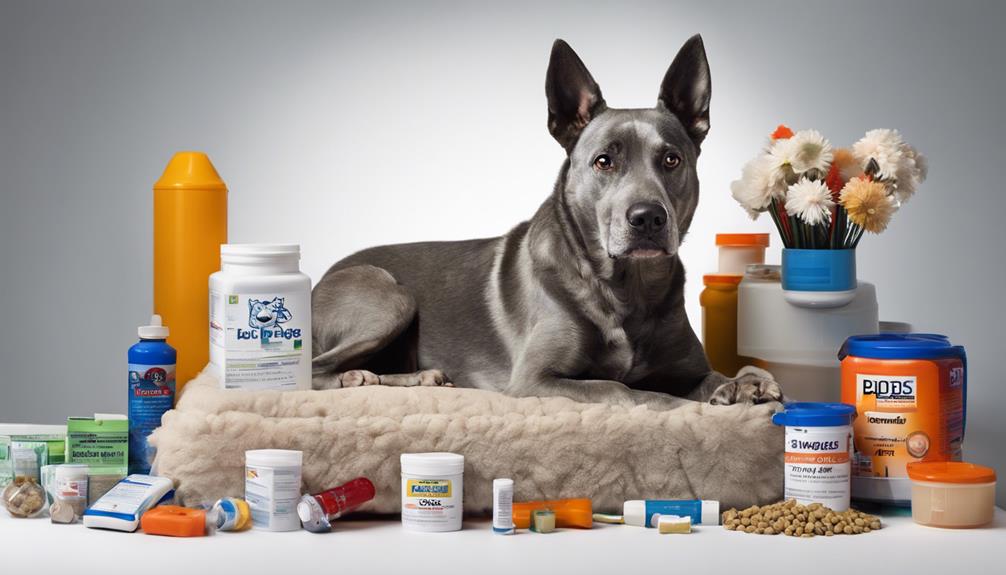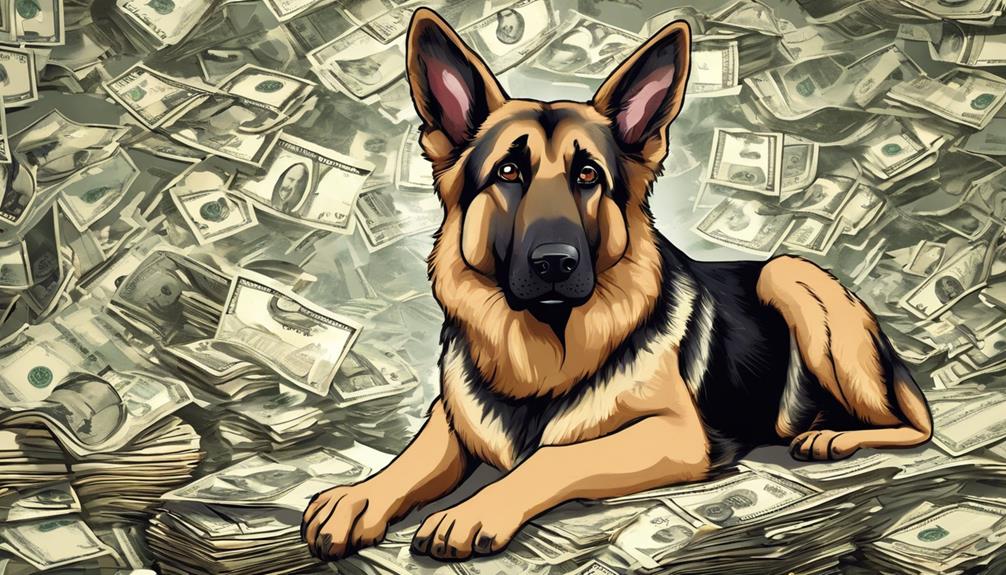Let’s stay focused and uncover the actual costs associated with owning a dog. From the initial expenses to the continual financial commitments, there is a lot to consider when budgeting for a pet.
But before you fetch those numbers, have you ever thought about the unexpected costs that might catch you off guard? Understanding the full scope of what it takes to provide for a dog goes beyond the basics.
Stay tuned to discover the ins and outs of budgeting for your canine companion.
Key Takeaways
- Initial costs include adoption fees, supplies, vet visits, and grooming services.
- Annual expenses cover vet check-ups, food, grooming, training, and insurance.
- Aging dogs require specialized diets, more vet visits, medication, and supplements.
- Breed-specific budgeting is crucial to understand varying healthcare costs and plan accordingly.
Initial Cost of Getting a Dog
When considering the initial cost of getting a dog, potential pet owners should be prepared for a wide range of expenses that can vary significantly based on factors such as adoption source, breed, and required supplies. Adoption fees from shelters can range from $50 to $300, while prices from breeders can escalate up to $11,500, depending on the breed's rarity and demand.
Additionally, essential supplies like a bed, leash, collar, and scratch board can add another $100 to $500 to the initial cost. It's crucial to factor in vet check-ups and vaccinations in the first year, which can amount to $75 to $100. Grooming services, which range from $30 to $90 per visit, should also be considered when budgeting for your new furry friend.
Understanding breed-specific health issues is vital as it can impact future medical expenses, helping pet owners plan their finances more effectively.
Annual Expenses for Dog Ownership

Exploring the annual expenses associated with owning a dog reveals a range of financial considerations that pet owners need to account for to ensure their furry companion's well-being and quality of life. Here are some key points to consider:
- Annual vet check-ups and vaccinations typically cost between $75 to $100 in the first year.
- Monthly food expenses for a dog can vary based on size and dietary needs, ranging from $40 to $80.
- Grooming costs for a dog can range from $30 to $90 per visit, depending on the required services.
- Additional annual expenses may include training services, pet insurance, as well as toys and entertainment.
- Adjustments for aging dogs, such as specialized diets and more frequent vet visits, contribute to the overall annual costs of owning a dog.
Understanding and budgeting for these annual expenses are crucial for providing your dog with the necessary care and attention they deserve throughout the year.
Cost Considerations as Dogs Age

As dogs age, the financial considerations for their care evolve, particularly with the increased need for specialized diets and more frequent vet visits to address age-related health concerns. Older dogs may require special diets and more frequent vet visits to manage age-related health issues. Health care costs for senior dogs tend to increase due to potential chronic conditions and age-related ailments. Budget for additional expenses like medication, supplements, and mobility aids as dogs age. Regular check-ups and preventive care become crucial to maintain the health and well-being of aging dogs. Understand the financial implications of caring for senior dogs, including potential end-of-life care costs.
| Cost Considerations as Dogs Age | Details |
|---|---|
| Specialized Diets | Tailored to meet senior dogs' needs |
| Increased Vet Visits | Address age-related health concerns |
| Medication | Potential need for ongoing treatment |
| Supplements | Support overall health and mobility |
| Mobility Aids | Assist aging dogs in daily activities |
Breed-Specific Budgeting

Considering the healthcare needs and financial commitments associated with different dog breeds is essential for effective budgeting when planning for pet ownership. It's vital to understand the breed-specific challenges and potential expenses that may arise to prepare adequately. Here are some key points to keep in mind when budgeting for different dog breeds:
- Varying Healthcare Costs: Different breeds come with varying healthcare costs based on their predisposition to certain health issues.
- Researching Health Issues: Conducting thorough research on breed-specific health issues can help estimate potential expenses accurately.
- Financial Implications: Understanding the financial implications of preferred breeds is crucial for budgeting effectively.
- Specialized Care Needs: Certain breeds may require specialized care, leading to higher healthcare costs than others.
- Long-Term Planning: Budgeting for breed-specific challenges is essential for planning long-term expenses related to dog ownership.
Smart Choices to Reduce Costs

To reduce dog care expenses significantly, consider grooming at home and making DIY toys. Grooming your dog at home not only saves money but also strengthens the bond between you and your furry friend. DIY toys are not only cost-effective but also provide mental stimulation for your pet. Another smart choice is making homemade dog treats; this way, you can control the ingredients, ensuring a healthier snack for your dog at a lower cost. Opting for generic or store-brand pet products is a practical way to save money without compromising quality. Additionally, utilizing online resources and community events for free or discounted dog training can help reduce training costs. Regular exercise and playtime with your dog are essential not only for their well-being but also for preventing costly health issues in the long run.
| Smart Choices to Reduce Costs | Benefits |
|---|---|
| Grooming at home | Saves money and strengthens bond |
| DIY toys | Cost-effective and provides mental stimulation |
| Homemade dog treats | Healthier snacks at a lower cost |
| Generic pet products | Saves money without compromising quality |
Frequently Asked Questions
How Much Does It Cost to Budget for a Dog?
We've got the scoop on how much it costs to budget for a dog. From initial adoption fees to annual expenses, owning a furry friend can range from $1,050 to $3,470, depending on your pup's needs.
What Is the Annual Budget for a Pet?
Our annual pet budget varies from $500 to $3,000, influenced by size, breed, and healthcare needs. Expenses cover food, vet care, grooming, toys, and supplies. Vet check-ups and vaccinations cost $75-$100 in the first year. Additional costs include insurance, training, and entertainment.
How Much Have You Budgeted per Year for the New Pet?
We budgeted wisely for our new pet, setting aside funds for routine vet care, emergency visits, and unexpected expenses. Planning for an annual cost of $1,500, we ensure our furry friend receives the best care without financial stress.
How Do You Raise a Dog on a Budget?
We raise a dog on a budget by adopting from a shelter, finding affordable vet care, DIY grooming, buying supplies wisely, and planning for emergencies with a separate savings account. These strategies help us provide excellent care without breaking the bank.
What Expenses Should I Budget for When Adopting a Dog from an Animal Shelter?
When adopting a dog, cost should include adoption fees, initial medical expenses, food and supplies, grooming, training, and potential emergency vet visits. Planning for these expenses can help ensure a smooth transition for your new furry friend and prevent any financial surprises down the road.
Conclusion
In conclusion, it's important to budget for all aspects of dog ownership to ensure the well-being of our beloved furry companions.
Did you know that the average annual cost of owning a dog can range from $1,000 to $2,000, depending on factors such as size, breed, and specific needs?
By planning ahead and making smart choices, we can provide our dogs with the care they deserve while maintaining financial stability.









